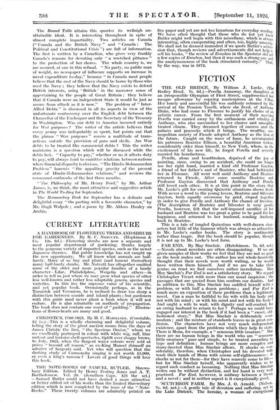FICTION
THE OLD BRIDGE. By William J. Locke. (The Bodley Head. 7s. 6d.)—Perella Annaway, the daughter of an irresponsible Olympian of Fleet Street, supplemented her meagre allowance by copying masterpieces at the Uffizi. Her lonely and uneventful life was suddenly coloured by the arrival at the Pension Toselli, where she lived, of Anthony Blake, who had come to Florence to justify his choice of an artistic career. From the first moment of their meeting Perella was carried away by the enthusiasm and vitality of Anthony, who also succumbed to her elusive and unsophis- ticated charm. They dreamed together of success and the palaces and peacocks which it brings. The wealthy, ens. mopolitan society of Fiesole adopted Anthony as the lion of the future. Caught on the wave of fame, he accompanied his patroness Beatrice Ellison, a beautiful American widow, considerably older than himself, to New York, where, in the excitement of his new life, he forgot Perella and secretly married his benefactress. '
Perella, alone and heartbroken, deprived of the joy of painting, since, owing to an accident, she could no longer use her right band, married a kind old Professor Gayton, a friend of her father's and of Beatrice, who had befriended her in Florence. All went well until Anthony and Beatrice returned to Fiesole. After some months Beatrice and Professor Gayton discovered that Anthony and Perella still loved each other. It is at this point in the story that Mr. Locke's gift for creating Quixotic situations shows itself. With never a word to the young lovers, Beatrice and Silvester Gayton, both equally overcome by grief, eloped together in order to give Perella and Anthony the chance of freedom. (The description of Beatrice and Silvester is very good.) Perella, however, felt that the self-imposed sacrifice of her husband and Beatrice was too great a price to be paid for her happiness, and returned to her husband, sending Anthony back to Beatrice.
This is a tale of tangled Quixotism with well-drawn char- acters but little of the humour which was always so attractive in Mr. Locke's earlier books. The story is sentimental rather than tragic. But the book should be popular, though it is not up to Mr. Locke's best form.






































 Previous page
Previous page